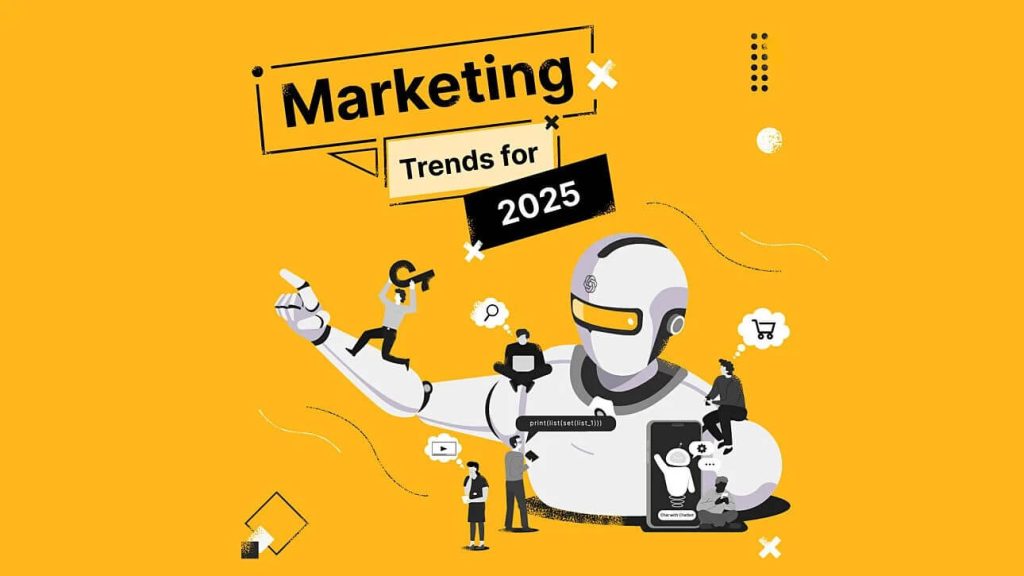Introduction
The digital marketing landscape is evolving rapidly, and staying ahead of the trends is crucial for businesses looking to maintain a competitive edge. As we step into 2025, several innovative marketing strategies, emerging technologies, and shifting consumer behaviors are set to redefine how brands connect with their audiences.
In this guide, we will explore the most significant digital marketing trends for 2025, providing insights into how businesses can leverage these changes to enhance their online presence. Additionally, for those interested in related industry updates, don’t miss our article on Australia’s Latest Fashion Trends, where we discuss the impact of digital influence on the fashion industry.
1. Artificial Intelligence (AI) and Machine Learning in Marketing
The Growing Role of AI
AI-driven marketing has already made a significant impact, but in 2025, its presence will be even more dominant. AI is expected to revolutionize digital marketing by automating tasks, personalizing customer experiences, and optimizing ad targeting.
AI-Powered Chatbots and Customer Engagement
Advanced AI chatbots will enhance customer service, providing real-time support and improving user interactions on websites. Businesses that integrate AI-driven chatbots will see increased engagement and conversion rates.

2. Voice Search Optimization
The Rise of Voice Search in SEO
As more consumers rely on voice assistants like Alexa, Google Assistant, and Siri, businesses must adapt their SEO strategies to include voice search optimization. Voice searches tend to be conversational and longer, requiring content to be structured in a more natural, question-based format.
How to Optimize for Voice Search
- Use long-tail keywords that mimic spoken queries
- Focus on featured snippets to improve visibility
- Optimize website content for local search, as many voice searches are location-based
3. Video Marketing Dominance
The Power of Short-Form Videos
Platforms like TikTok, Instagram Reels, and YouTube Shorts have demonstrated the effectiveness of short-form video content. In 2025, video marketing will continue to dominate, and businesses that invest in engaging, high-quality video content will capture more audience attention.
Interactive and Shoppable Videos
Brands are expected to integrate interactive and shoppable videos into their digital marketing strategies, allowing customers to purchase products directly through video content.
4. Social Media Marketing Trends
The Growth of Niche Social Media Platforms
While Facebook, Instagram, and LinkedIn remain dominant, niche platforms such as BeReal and Discord are gaining popularity. Marketers must diversify their strategies to engage audiences across multiple platforms.
User-Generated Content and Authenticity
Consumers in 2025 will favor authentic, user-generated content (UGC) over traditional brand messaging. Encouraging customers to share their experiences through reviews, testimonials, and social media posts will boost trust and engagement.

5. Influencer Marketing Evolution
The Shift Toward Micro-Influencers
While celebrity endorsements still hold value, micro-influencers (those with smaller but highly engaged audiences) will dominate influencer marketing in 2025. These influencers offer higher engagement rates and better authenticity, making them a preferred choice for brands.
AI-Driven Influencer Marketing
AI tools will help brands identify the right influencers, analyze engagement metrics, and track ROI more effectively.
6. The Rise of Interactive Content
Engaging Audiences with Interactivity
Traditional static content is losing effectiveness. Instead, interactive content like quizzes, polls, and augmented reality (AR) experiences will capture audience attention. These elements provide a more immersive user experience, keeping visitors engaged for longer periods.
Augmented Reality (AR) in Marketing
AR is becoming an essential tool for digital marketers, particularly in e-commerce and retail industries. Customers can now “try before they buy” using AR features, increasing their confidence in purchases.
7. The Importance of Data Privacy and Ethical Marketing
Stricter Data Protection Regulations
As consumers become more concerned about data privacy, companies must adapt their marketing strategies to align with GDPR, CCPA, and other privacy laws. Transparency in data collection and usage will be crucial.
Ethical and Sustainable Marketing
Consumers are actively seeking brands that align with sustainability and ethical values. Brands that emphasize eco-friendly practices and responsible marketing will gain customer loyalty in 2025.
8. Content Marketing and Personalization
AI-Powered Content Creation
With AI-driven tools like ChatGPT and Jasper, businesses can create personalized content at scale. However, maintaining human authenticity in content remains key.
Hyper-Personalization in Email Marketing
Email marketing will evolve further with hyper-personalization, where AI analyzes user behavior to deliver highly relevant, automated email sequences that drive engagement.

9. Programmatic Advertising and Automation
Smarter Ad Targeting with AI
Programmatic advertising is set to become even more precise in 2025, using AI and machine learning to optimize real-time ad placements. This ensures businesses reach the right audience at the right time, maximizing ROI.
The Role of Privacy-First Advertising
With third-party cookies being phased out, businesses must adopt privacy-first advertising strategies like contextual targeting and first-party data collection.
10. The Integration of Blockchain in Digital Marketing
Enhanced Security and Transparency
Blockchain technology is making digital marketing more transparent and secure. Marketers can use blockchain to verify ad authenticity, prevent fraud, and enhance data security.
Crypto and NFT Marketing
Brands experimenting with cryptocurrency payments and NFTs are creating new ways to engage with tech-savvy consumers, offering unique digital experiences and ownership models.
Conclusion
The future of digital marketing in 2025 is driven by AI, personalization, privacy, and innovative content formats. Businesses that adapt to these emerging trends will maintain a competitive edge and deliver better customer experiences.
As digital marketing continues to evolve, staying informed and adapting strategies is essential for success.
By embracing these trends, businesses can thrive in the ever-changing digital landscape while building stronger connections with their au.

